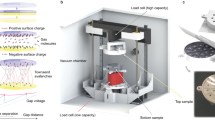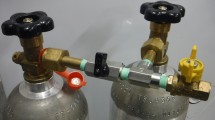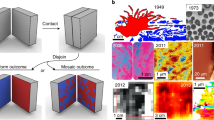Abstract
IT is well known that the leakage of charge from high-voltage static generators, such as the Van de Graaff machine, is controlled by use of high pressure or other suitable atmospheres which increase the dielectric strength of the medium in which they operate. The results reported below suggest that in a study of the mechanism of frictional electrification, quantitative measurements may be of doubtful value, because a similar leakage is apt to take place between the rubbing surfaces and to control the process of charge separation.
This is a preview of subscription content, access via your institution
Access options
Subscribe to this journal
Receive 51 print issues and online access
$199.00 per year
only $3.90 per issue
Buy this article
- Purchase on Springer Link
- Instant access to full article PDF
Prices may be subject to local taxes which are calculated during checkout
Similar content being viewed by others
References
King and Medley, Nature, 160, 438 (1947).
Rodine and Herb, Phys. Rev., 51, 508 (1937).
Author information
Authors and Affiliations
Rights and permissions
About this article
Cite this article
MEDLEY, J. Frictional Electrification and Gaseous Discharge. Nature 166, 524–525 (1950). https://doi.org/10.1038/166524a0
Issue Date:
DOI: https://doi.org/10.1038/166524a0
This article is cited by
Comments
By submitting a comment you agree to abide by our Terms and Community Guidelines. If you find something abusive or that does not comply with our terms or guidelines please flag it as inappropriate.



